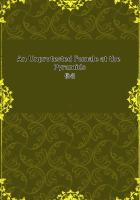On the other hand, as the growth of the State gives the depositaries of the public authority more temptations and chances of abusing their power, the greater the force with which the government ought to be endowed for keeping the people in hand, the greater too should be the force at the disposal of the Sovereign for keeping the government in hand.I am speaking, not of absolute force, but of the relative force of the different parts of the State.
It follows from this double relation that the continuous proportion between the Sovereign, the prince and the people, is by no means an arbitrary idea, but a necessary consequence of the nature of the body politic.It follows further that, one of the extreme terms, viz., the people, as subject, being fixed and represented by unity, whenever the duplicate ratio increases or diminishes, the simple ratio does the same, and is changed accordingly.
From this we see that there is not a single unique and absolute form of government, but as many governments differing in nature as there are States differing in size.
If, ridiculing this system, any one were to say that, in order to find the mean proportional and give form to the body of the government, it is only necessary, according to me, to find the square root of the number of the people, I should answer that I am here taking this number only as an instance; that the relations of which I am speaking are not measured by the number of men alone, but generally by the amount of action, which is a combination of a multitude of causes; and that, further, if, to save words, I borrow for a moment the terms of geometry, I am none the less well aware that moral quantities do not allow of geometrical accuracy.
The government is on a small scale what the body politic which includes it is on a great one.It is a moral person endowed with certain faculties, active like the Sovereign and passive like the State, and capable of being resolved into other similar relations.This accordingly gives rise to a new proportion, within which there is yet another, according to the arrangement of the magistracies, till an indivisible middle term is reached, i.e., a single ruler or supreme magistrate, who may be represented, in the midst of this progression, as the unity between the fractional and the ordinal series.
Without encumbering ourselves with this multiplication of terms, let us rest content with regarding government as a new body within the State, distinct from the people and the Sovereign, and intermediate between them.
There is between these two bodies this essential difference, that the State exists by itself, and the government only through the Sovereign.
Thus the dominant will of the prince is, or should be, nothing but the general will or the law; his force is only the public force concentrated in his hands, and, as soon as he tries to base any absolute and independent act on his own authority, the tie that binds the whole together begins to be loosened.If finally the prince should come to have a particular will more active than the will of the Sovereign, and should employ the public force in his hands in obedience to this particular will, there would be, so to speak, two Sovereigns, one rightful and the other actual, the social union would evaporate instantly, and the body politic would be dissolved.
However, in order that the government may have a true existence and a real life distinguishing it from the body of the State, and in order that all its members may be able to act in concert and fulfil the end for which it was set up, it must have a particular personality, a sensibility common to its members, and a force and will of its own making for its preservation.
This particular existence implies assemblies, councils, power and deliberation and decision, rights, titles, and privileges belonging exclusively to the prince and making the office of magistrate more honourable in proportion as it is more troublesome.The difficulties lie in the manner of so ordering this subordinate whole within the whole, that it in no way alters the general constitution by affirmation of its own, and always distinguishes the particular force it possesses, which is destined to aid in its preservation, from the public force, which is destined to the preservation of the State; and, in a word, is always ready to sacrifice the government to the people, and never to sacrifice the people to the government.
Furthermore, although the artificial body of the government is the work of another artificial body, and has, we may say, only a borrowed and subordinate life, this does not prevent it from being able to act with more or less vigour or promptitude, or from being, so to speak, in more or less robust health.Finally, without departing directly from the end for which it was instituted, it may deviate more or less from it, according to the manner of its constitution.
From all these differences arise the various relations which the government ought to bear to the body of the State, according to the accidental and particular relations by which the State itself is modified, for often the government that is best in itself will become the most pernicious, if the relations in which it stands have altered according to the defects of the body politic to which it belongs.2.THE CONSTITUENT PRINCIPLE IN THE VARIOUS FORMS OF GOVERNMENT T O set forth the general cause of the above differences, we must here distinguish between government and its principle, as we did before between the State and the Sovereign.
The body of the magistrate may be composed of a greater or a less number of members.We said that the relation of the Sovereign to the subjects was greater in proportion as the people was more numerous, and, by a clear analogy, we may say the same of the relation of the government to the magistrates.
But the total force of the government, being always that of the State, is invariable; so that, the more of this force it expends on its own members, the less it has left to employ on the whole people.















